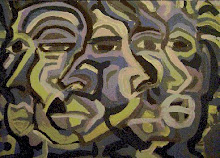I recently came across an argument over the morality of Slavery. The link provided was;
http://www.inu.net/skeptic/slavery.html
The current CNN series Black in America explores many issues of the African-American experience. Slavery and it's effects seem to be the most common reason given for our current condition. I am of the mind set of letting go of the past and working toward a better future.
Here is my response to to Original Poster of the above link;
I am not much of a philosopher, so I may be at a disadvantage in trying to explain my point of view. I think that I'll be using laysayfair'r cited site as a starting point.
When we say that something is immoral, it is to assume a reasonable agreement on a certain level of morality. Citing the Bible as a reference becomes confusing because of the many seemingly contradictory views expressed within it's pages. To assume a type of inherent concept of morality would discount the learned aspect of morality. Although we could argue about the learned type as being more about the revelation of pre-existing morality. [This type of meta-physics and Entanglement Theory is a bit too complicated to go into any great detail in this opinion.]
IMO - There is a natural order to things. While Slavery was wrong (IMO), the slave wasn't worthy of freedom until he had earned it. [The Africans who conquered the lesser tribes and sold them into slavery had "earned" their freedom by being the victors. The losing tribes had not (yet) earned a higher position and were left with the consequences.]
African Americans could have taken the lead of rebels like Nat Turner and fought to try to earn their freedom. Many slaves escaped the situation (Underground Railroad) while others somehow bought their freedom (both earned).
As greater a greater understanding of what America's morality was going to be was revealed, the anti-slavery movement seemed to take root. The North's philosophy (at that time) seems to have won the whole debate with the South's philosophy (at that time). Freedom was earned by those on the winning side of the Civil war.
Later, legal, intellectual or philosophical (as opposed to armed) battles were fought to extend (or recognize) the Constitutional rights of ALL Americans. The sixties produced a culture that was apparently ready to determine it's own future in a Government enforced freedom for all. They had apparently earned their freedom through years of service, humiliation, oppression and endurance. I think that more non-Blacks had respect (not pity or guilt) for these traits and chose to join the fight (or march, or protest or just be seen) against the existing model of morality.
Those with this new view of morality succeeded in their approach and we now have the level of morality that we generally accept as our own.
The next step in this process is one of personal responsibility.
This opinion can easily be shot full of holes. So in the words of Aristotle: "Come, let us get on with the enquiry".
Sunday, July 27, 2008
Subscribe to:
Post Comments (Atom)














No comments:
Post a Comment